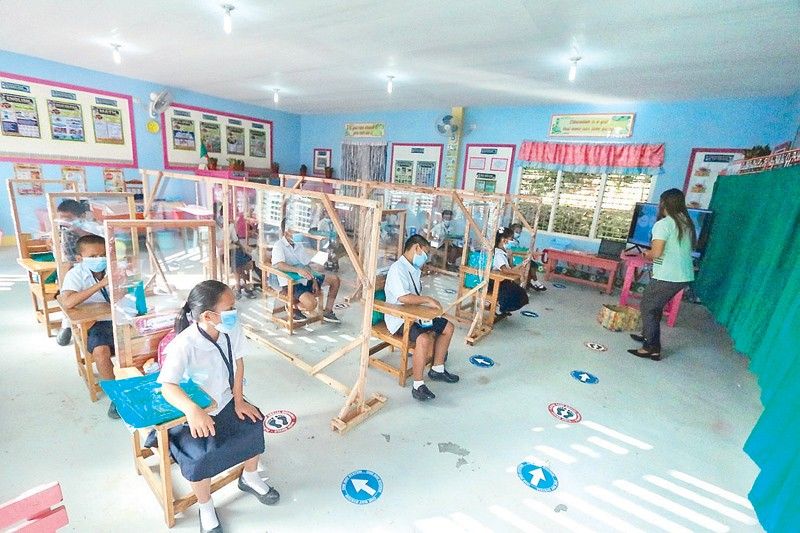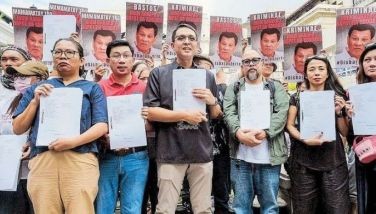Students, doctors still see problems as more schools reopen

MANILA, Philippines — Progressive student organizations and some doctors flagged potential problems that may arise as more schools welcome students again after one of the longest school shutdowns in the world due to the coronavirus pandemic.
Students have welcomed the Commission on Higher Education's decision to expand face-to-face classes for all degrees in areas under Alert Level 2, but they remain critical of its attempt to place the burden of a safe reopening of schools on the shoulders of higher educational institutions.
For Tierone James Santos, a co-convenor of Rise for Education, the CHED is obviously passing the buck to colleges and universities, who are required to retrofit their facilities despite budget cuts for several state universities and colleges.
“With the budget cuts, the schools will have a hard time, whether these are SUCs, HEIs, or even public schools,” Santos said.
Coleen Mañibo, the national secretary general of the National Union of Students of the Philippines, said universities should not be given these responsibilities given that they do not have the needed funds for this.
“If the government will continuously let school administrators and education sector carry the responsibilities, then it will not be sustainable,” Mañibo told Philstar.com.
CHED chairman Prospero de Vera told Philstar.com that student organizations continuously criticize the commission without presenting better solutions, adding that they should instead pressure Congress to give them more funding.
Student groups like the NUSP, however, have said that they have created their own roadmap for the reopening of schools.
“The problem is that CHED, DepEd (Department of Education), and even the national government still hadn’t released comprehensive guidelines so we cannot check what will happen to the re-opening of schools and we cannot compare it to our own road map for safe schools re-opening,” Mañibo said.
De Vera said that for the next batch of students who will return for face-to-face classes, they will use the same system used by the first batch wherein "less than one percent" of the more than 20,000 students and 2,000 teaching personnel caught COVID-19 as 90% of them were vaccinated.
“The system is working,” he said.
But this is not good news for Mañibo who believes that no student should contract COVID-19. Even if someone does get infected, they should get enough assistance from the national government.
Vaccination mandatory for in-person classes
CHED said Wednesday that only fully-vaccinated students can join limited in-person classes, while those who have not yet been inoculated will continue studying from home.
Student groups, however, said that vaccinations should not be mandatory for students.
“You cannot have vaccination as a prerequisite because there is vaccine hesitancy,” Jen Balaoro, another convenor for Rise for Education, told Philstar.com.
“With or without vaccination, the national government should be ready for physical classes because students’ right to learn should not be compromised just because they are scared to contract COVID-19 or that they are not vaccinated,” Mañibo said.
Raymond John Naguit, a medical doctor running for a congressional seat as the second nominee of Akbayan party-list, echoed this, saying that vaccination should not be a prerequisite to the resumption of classes.
“We recognize that there is a very limited supply and we have what we call patient autonomy and it is something that is recognized by the medical community,” Naguit said.
Instead of requiring vaccination, Balaoro suggested that the government should provide antigen testing for students and teachers so they can get screened for COVID-19.
But Dr. Bernadette Seludo, former President of Philippine Hospital Infection Control Society Inc., does not agree with just letting students and teachers who do not want to get jabbed get away.
“We are in a pandemic right? And what’s at stake here is national interest,” Seludo told Philstar.com. "Vaccination is the only way to counter the virus so it would not mutate."
Vaccine hesitancy, at least in the eyes of De Vera, is "very, very low" as both students and teachers want to get inoculated against the coronavirus. He added that they have vaccinated one million students since October 15.
“After we have exhausted all those who want to be vaccinated, then I will start worrying for those who have vaccine hesitancy,” he said, adding that there are other learning options for the "small number" of students who do not want to get vaccinated.
He added that since there are other schooling options aside from face-to-face classes, students will not be discriminated in terms of access to education.
“The policies of government, the policies of CHED [is to always] address the bigger number of students,” the CHED chairman said.
Threat of another surge
The drop in new cases of COVID-19 in the country has prompted the government's pandemic task force to rapidly roll back restrictions on many sectors and activities, including in-person classes.
However, the threat of the heavily-mutated Omicron variant looms over the Philippines' recovery and the reopening of schools, with health officials saying it is just a matter of time until it enters the country.
“If we are going to implement this return to school or limited face-to-face classes, we should highlight that there are different agencies that need to talk,” Naguit said, adding that students, teaching and non-teaching personnel should all be taken into account.
He added that there should be a closer look at students who come from areas with high COVID-19 cases or who live with people who belong to the high-risk population, like those with weakened immune systems and the elderly.
He also said attention should be paid to the average daily attack rate, which is the number of new cases in a certain area in the past two weeks divided by its total population.
He also emphasized the need to make COVID-19 testing more accessible, improve contact tracing and provide assurance that there would be a safety net for students who will get infected at school.
Seludo, meanwhile, said minimum health protocols should be strictly followed while vaccination is ramped up and ventilation in schools is ensured.
“What we will do here is that we have limited number of students,” Seludo said, adding that the country needs to move on amid the presence of virus.
But for student organizations, the threat of yet another devastating surge is always present until the government responds to the call for a "comprehensive, medical and scientific solution" to the pandemic.
“If there is a good pandemic response, a surge will be less likely,” Mañibo said, citing that surges happened even when schools were shut.
John Louis Gonzales, the head convenor of Student Aid Network, echoed this, saying that if students from the provinces will return for face-to-face classes in areas like Metro Manila where many universities are located, surges can happen.
“However, if protocols are followed and guidelines to meet the minimum health standard are indeed student-centered, we can minimize the risk of transmission within the campuses,” Gonzales told Philstar.com.
- Latest
- Trending































